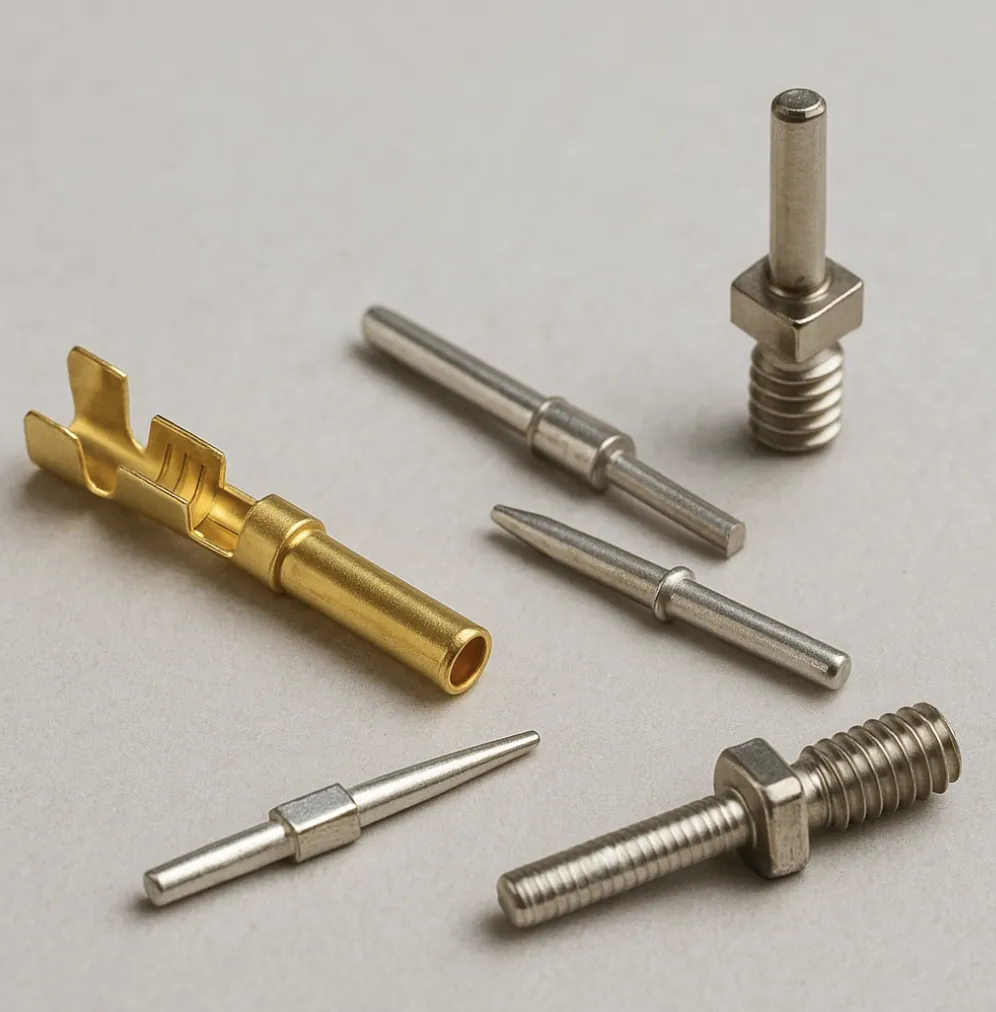In this blog, we explore the difference between various types of circular connector pins – PCB pins, crimp pins, solder pins, and screw pins that are commonly used in electrical and electronic connectors. We also look at the four major types of connector pins, their functions, advantages, and ideal use cases across industries to help users determine which pin type is best suited for their specific requirements.
1. Solder Pins: Consistent, Stable Low-Resistance Connections
Solder pins provide one of the most stable electrical connections available, forming a strong metallurgical bond through the soldering process. They are ideal in applications where permanence and high conductivity are more important than serviceability.
Advantages of Solder Pins
- Excellent conductivity and minimal contact resistance
- Compact and durable
- Long-term reliability under temperature and mechanical stress
Industry Use Case
Proper soldering technique is crucial for achieving optimal results. Manufacturers carefully control temperature, wetting angle, and flux quality to prevent defects such as cold joints.
Solder cup contacts are often used to achieve clean, stress-free terminations.
Common Applications:
- Aerospace systems
- High-power or sealed connectors
- Industrial control boards
2. Crimp Pins: Reliable and Vibration-Resistant Connections
Crimp pins are the industry standard for creating reliable connections in wire harnessing applications, especially in environments exposed to movement, dust, or vibration. Instead of soldering, wires are mechanically compressed into the pin barrel using precision crimping tools.
Advantages of Crimp Pins
- Strong mechanical and electrical bond
- Excellent resistance to vibration and fatigue
- Fast, tool-based assembly with no heat involved
- Suitable for automation and mass production
Industry Use Case
Consistency in crimping defines performance, making these pins ideal for high-stress environments such as railways or aerospace, where connection precision is critical. Crimp pins are often gold-plated for corrosion resistance and signal stability.
Common Applications:
- Automotive connectors
- Railway systems
- Industrial machinery
- Aerospace and defense
3. PCB Pins: Compact and Reliable for Board-Level Connections
PCB pins (Printed Circuit Board pins), also known as header pins, are widely used in board-level interconnects. They form the essential link between the circuit board and external modules, making them a key component in wire-to-board and board-to-board applications.
Advantages of PCB Pins
- Compact and standardized across electronic designs
- Reliable for low- to medium-current applications
- Ideal for modular and space-constrained systems
Industry Use Case
Manufacturers ensure tight tolerances and uniform plating (tin, gold, or nickel) to minimize resistance and enhance long-term performance.
Common Applications:
- Control panels
- Sensor boards
- Consumer electronics
4. Screw Pins: Easy Maintenance and High Current Capacity
Screw pins (or screw terminal connectors) use a mechanical clamping system to securely hold wires. They are preferred in industrial and field applications where cables or connections need to be re-tightened or replaced frequently.
Advantages of Screw Pins
- Easy installation and maintenance
- Reusable and tool-accessible
- Handles thicker wires and higher current loads
Industry Use Case
Since vibration can loosen screws over time, manufacturers now design spring-loaded clamps and anti-vibration screws to improve safety and reliability in harsh conditions.
Common Applications:
- Power distribution systems
- Industrial control equipment
- Field wiring and test benches
Choosing the Right Connector Pin for Your Application
Whether crimped, soldered, press-fitted, or screwed, each connector pin type offers unique advantages based on the application and environmental stress. Modern connector manufacturers are focusing on sustainability, precision, and consistency, ensuring every pin performs reliably through thousands of mating cycles.
For OEMs and manufacturers, choosing the right connector pin means aligning design specifications with practical performance.
👉 For more information or assistance, contact us at:
https://jetronicsindia.com/contact/


